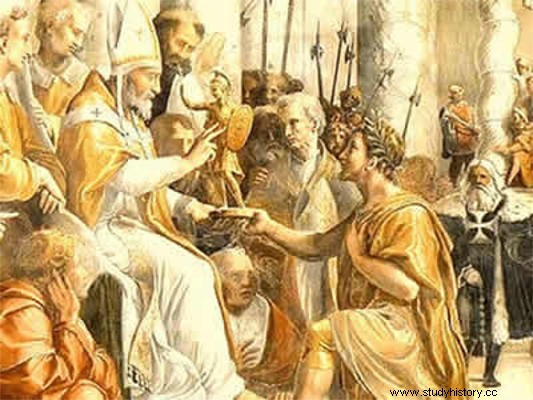
By Rainer Sousa
In the process of formation of the Catholic Church, we observed that the strengthening of this institution faced situations that threatened its unity. One of them occurred in the year 476, when the fall of the last Roman emperor in the West established the triumph of the barbarian invasions in Europe. More than a simple political and military event, this event could mean the weakening of Christianity in the face of the pagan religions that were taking shape.
It was then that the clerics of the highest Christian summit presented the so-called Donation of Constantine, a document from 337 in which the Roman Emperor of the same name would have reserved the entire Western Roman Empire for the Church . Despite not having taken over the European kingdoms directly, this same document had great political force to express the influence of Christian leaders against the kingdoms that were organized at that time.
This is how we see, among other arguments, how the Church has accumulated its power to interfere in political matters in Europe. However, the weight of this document ended up being unmasked in the 15th century, when the scholar Lorenzo Valla presented a series of documents that would prove the falsity of the time when the donation document would have been made.
At that time it was impossible to use any technological resource that could calculate the exact date of the document. It was then that Lorenzo examined the content of the text, noting the existing linguistic errors and the expressions used in its construction. Through his studies, he detected the presence of Hellenisms and barbarism that did not correspond to the use of the Latin language in those times of the empire of Constantine.
Besides these formal issues, the scholar realized that the nature of the document, prepared with a single testimony, did not correspond to the custom of the time. At the same time, he pointed out as incongruous the use of the term “satrap” (an expression of an oriental nature) to refer to the members of the Roman Senate and the mention of Constantinople as a Christian city at a time when it, as well as other regions given as Roman domination, was far from assuming such a position.
Valla's work, over time, was not just an attempt to destabilize the authority of the clergy. For historians, their way of questioning the document required the gathering of information that involved the transformations of the language over time and the need to establish a relationship of identity between the document and the time in which it would have been produced. In this way, the invalidation of the Donation of Constantine served as a great contribution to the study of the past.
